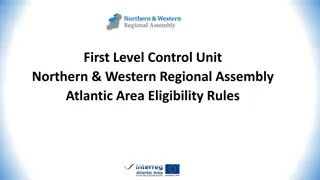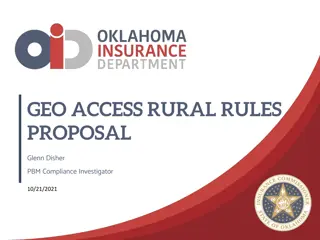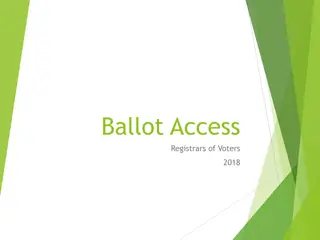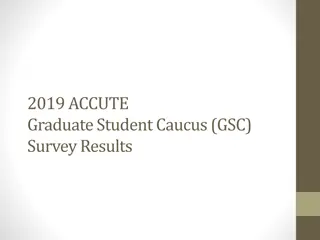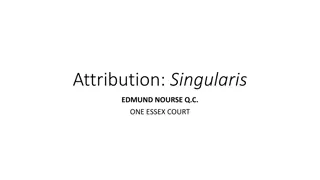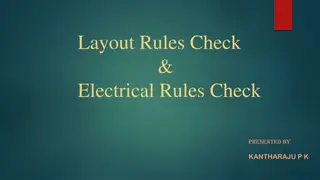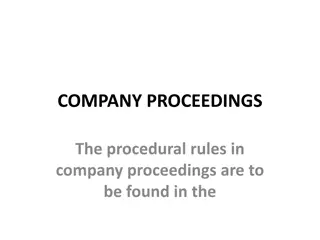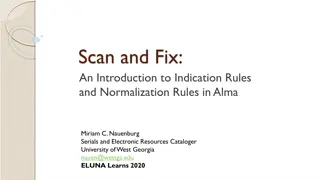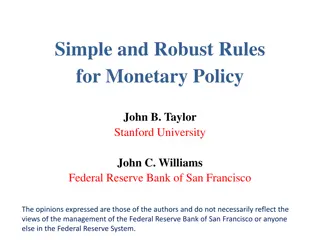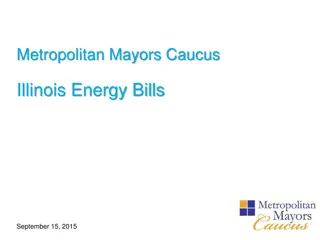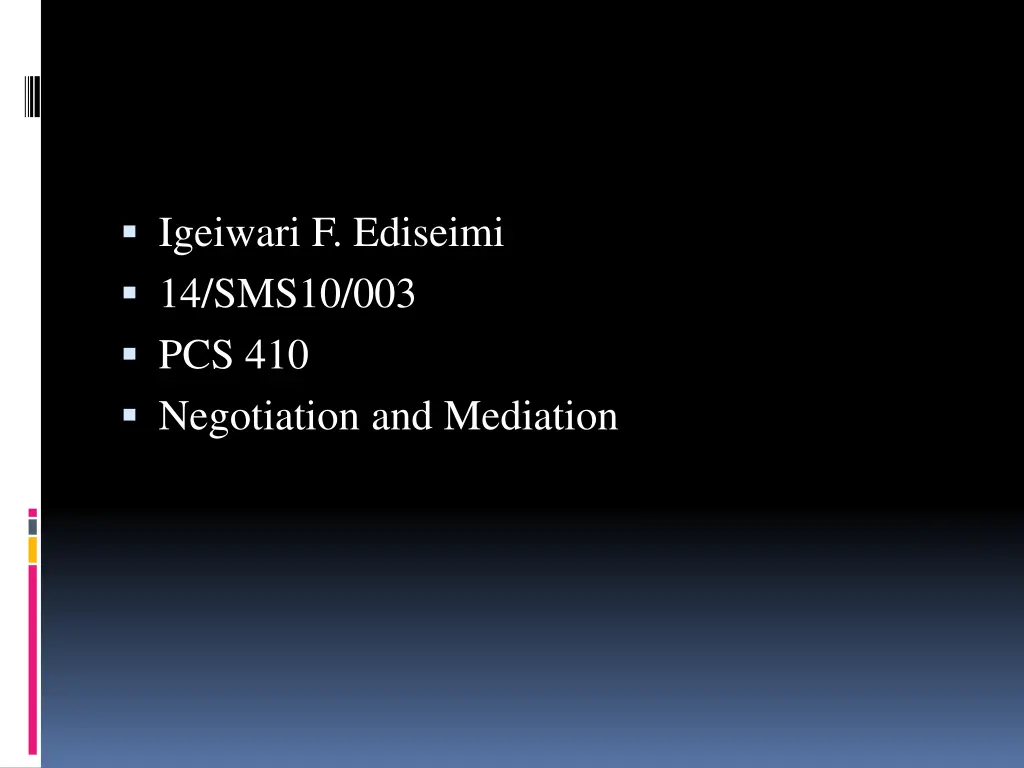
Understanding Ground Rules in Mediation Process
Learn about the importance of ground rules in mediation, how they are developed, categorized, and the specific behavioral and process rules involved. Discover how these rules help maintain order, fairness, and respect during the mediation process.
Download Presentation

Please find below an Image/Link to download the presentation.
The content on the website is provided AS IS for your information and personal use only. It may not be sold, licensed, or shared on other websites without obtaining consent from the author. If you encounter any issues during the download, it is possible that the publisher has removed the file from their server.
You are allowed to download the files provided on this website for personal or commercial use, subject to the condition that they are used lawfully. All files are the property of their respective owners.
The content on the website is provided AS IS for your information and personal use only. It may not be sold, licensed, or shared on other websites without obtaining consent from the author.
E N D
Presentation Transcript
Igeiwari F. Ediseimi 14/SMS10/003 PCS 410 Negotiation and Mediation
Presentation on... Ground Rules
Contents Introduction Meaning of Mediation Ground Rules Categories of Ground Rules Importance of Ground Rules Conclusion
Introduction Ground rules in mediation set the manner for the mediation session or process and are agreed by parties prior to when the mediation starts. Ground rules provide boundaries of acceptable behaviour between parties in However, the mediator monitors the ground rules to be observed between parties and not to be pushed away. Ground rules are important because it makes the mediation process to go smoothly. the mediation process.
What are Ground Rules? Ground rules are standards or codes of conduct for mediation, arbitration, consensus building and negotiation. Ground rules cover the behaviour of disputants, the role and behaviour of the mediator. Ground rules are negotiated before the meeting or on the first meeting. The rules also cover the process or methods to be used in the mediation as well as the manner of discussion. Ground rules are set so parties will be treated fairly and equally.
What are Ground Rules? Ground rule are developed with the help of the mediator which also defines the role of the mediator as well as the mediator s degree of authority. The rules enable the mediator to set the agenda for each meeting which will be approved by parties, that the mediator will lead the process and an equal amount of time for parties to talk.
Categories of Ground Rules Ground rules are classified into: Behavioural ground rules Process ground rules Procedural ground rules
Behavioural Ground Rules Behavioural ground rules for mediation include no interruption while one party is talking i.e. parties must talk one at a time, active listening i.e. parties must listen carefully to each other s statements, they must treat one another with dignity and respect, a party must not dominate or get special privileges in the mediation process as well as no attacks on the values and culture of one another.
Process Ground Rules Process rules are rules guiding how the mediation will go. Such rules include time for the meeting and that parties are expected to be on time, approval of substitute representative before the meeting, if parties are to raise their hand and wait to be called before talking or talk freely, if observers are/are not allowed in the mediation room and how to reschedule meetings.
Procedural Ground Rules These rules define the nature of the meeting (closed or open), and ways to deal with the news media. Mediation ground information provided in the mediation room be confidential, but upon information can be released. Ground rules are developed on who will talk to the press, who writes press release, the kind of information to release and how often to release the information. Also, parties agree not to reveal settlement until all parties have accepted the settlement. rules require that agreement, particular
Importance of Ground Rules Ground rules are important because they guide the mediation process in order to resolve the dispute at hand. Parties sometimes discuss and agree on the ground rules to develop, it is a way of disputants working together effectively which can enable communication between them and ease settlement. However, ground rules can be dangerous at times because it gives privilege to an already privileged group thereby making the other group uncomfortable to communicate.
Conclusion Ground rules are developed to guide the mediation process. Parties discuss the rules to be developed with the help of the facilitator and the facilitator monitors the rules in order for parties follow the rules and not ignore them. The ground rules make the mediation process easy going for an amicable agreement to be reached.
Reference Maiese, Michelle. "Ground Rules." Beyond Intractability. Eds. Guy Burgess and Heidi Burgess. Conflict Research Consortium, University of Colorado, Boulder. Posted: September 2004 <http://www.beyondintractability.org/essay/gr ound_rules/>.
Presentation on... CAUCUS
Contents Introduction Meaning of Caucus Caucus Steps Advantages of Caucus Things to Consider in Caucus Conclusion
Introduction A caucus in mediation is a meeting held outside the mediation room between the mediator and each disputant. The purpose of a caucus is for the information that disputants comfortable sharing in front of each other in the mediation room. The mediator then meets separately with each disputant. mediator to gather not do feel
Meaningof Caucus Caucuses are meetings that are held separately by the mediator with each side of a dispute. The meeting is usually called in the mediation process either by the mediator or by parties in order to work out the problem. A caucus may be called to assess both external and internal changes that occur in the mediation process, such as whether to continue the mediation, change the focus or to call off the mediation if it seems impossible to reach an agreement.
Meaningof Caucus A caucus may also be called to allow parties develop emotions without injury to the other party. It helps in changing negative behaviours, communication between parties and clarify misunderstanding. A caucus is also called for parties and the mediator mediation process used or to design a new procedure for the mediation process causing more limit destructive to assess the
StepstoCaucus Before opening the caucus, review agreement of confidentiality with the party and give the disputant an opportunity to talk by asking open-ended questions. The mediator should use the skill of active listening while the party is talking to take notes and summarize everything.
Use a procedure that will make parties loosen up their fixed positions. Give the party an opportunity to raise issues that have not been raised by the mediator. End the caucus confidentiality. with assurance of
ThingstoConsiderin Caucus Forewarning/Explanation of purpose: Before the beginning of mediation, the mediator should explain to parties what a caucus is and that a caucus may be held sometimes during the mediation. They should be aware of how caucus can help the mediation and that it can be called by either parties or the mediator. Timing: Caucuses are held at any time in the mediation, but its timing is associated with certain problems. For instance, a caucus at the end of mediation is designed to develop or assess proposals for settlement, develop a settlement formula or to achieve settlement.
Confidentiality: One of the ground rules of mediation is confidentiality and so is caucus. The mediator agrees to keep confidential whatever information party provide in caucus when they come back together for discussion. Trust: Mediator should ensure to earn the trust of parties. While in caucus with one party, the party left outside should not get suspicious of what transpired. Also, the mediator should give equal treatment to parties i.e. the same amount of caucuses should be held with parties and same amount of time should spent to prevent generating mistrust
AdvantagesofCaucus The absence of the other party will make the party in caucus to be less angry, anxious and the party will be more flexible and creative. Separating the parties allow open communication with the mediator. The party in caucus can be more comfortable to communicate information to the mediator and suggest ways to reach agreement Caucus helps the mediator to interact with the party in caucus without the other party feeling left out. It enable the mediator to challenge the party to shift ground for settlement.
Conclusion A caucus is a closed-door meeting a mediator holds separately with disputants that may occur during the mediation. The purpose of a caucus is to reduce tensions between parties and to enable parties communicate effectively in the absence of the other party in order to ease settlement of the dispute.
Reference Spangler, Intractability. Eds. Guy Burgess and Heidi Burgess. Conflict University of Colorado, Boulder. Posted: June 2003 <http://www.beyondintractability.org/essay/ca ucus/>. Brad. "Caucus." Beyond Research Consortium,






